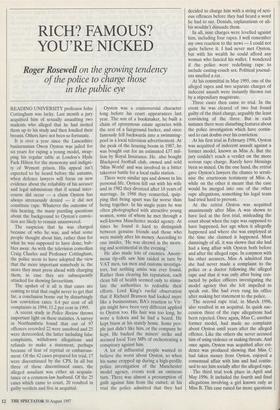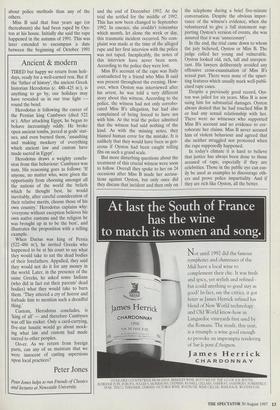RICH? FAMOUS?
YOU'RE NICKED
Roger Rosewell on the growing tendency
of the police to charge those in the public eye
READING UNIVERSITY professor John Cottingham was lucky. Last month a jury acquitted him of sexually assaulting two students who alleged that he had invited them up to his study and then fondled their breasts. Others have not been so fortunate.
It is over a year since the Lancashire businessman Owen Oyston was jailed for six years for raping a young model, swap- ping his regular table at London's Hyde Park Hilton for the monotony and indigni- ty of Wymott prison. His appeal isn't expected to be heard before the autumn, when defence lawyers will focus on new evidence about the reliability of his accuser and legal submissions that if sexual inter- course did occur — a claim Oyston has always strenuously denied — it did not constitute rape. Whatever the outcome of this hearing, the many puzzling questions about the background to Oyston's convic- tion are likely to remain unanswered.
The suspicion that he was charged because of who he was, and what some people thought about him, rather than for what he was supposed to have done, bub- bles away. As with the television comedian Craig Charles and Professor Cottingham, the police seem to have adopted the view that the more important somebody is, the more they must press ahead with charging them, in case they are subsequently attacked for showing favouritism.
The upshot of it all is that cases are coming to trial that ought never to get that far, a conclusion borne out by disturbingly low conviction rates: 8.4 per cent of all complaints in 1994; 11.2 per cent in 1995.
A recent study in Police Review throws important light on these statistics. A survey in Northumbria found that out of 97 offences recorded 22 were unsolved and 25 were derecorded, the latter including false complaints, withdrawn allegations and refusals to make a statement, perhaps because of fear of reprisal or embarrass- ment. Of the 42 cases prepared for trial, 17 were discontinued by the CPS. In all but three of these discontinued cases, the alleged assailant was either an acquain- tance or a common-law husband. Of the 25 cases which came to court, 20 resulted in guilty verdicts and five in acquittal. Oyston was a controversial character long before his court appearances last year. The son of a bookmaker, he built a chain of eponymous estate agencies with the zest of a fairground barker, and once famously fell backwards into a swimming- pool in a local television advertisement. At the peak of the housing boom in 1987, he was bought out for an estimated £37 mil- lion by Royal Insurance. He also bought Blackpool football club, owned and sold `Miss World' and was involved in a bitter takeover battle for a local radio station.
There were similar ups and downs in his personal life. Oyston fell out with his wife and in 1982 they divorced after 18 years of marriage. In 1988 they remarried, quip- ping that being apart was far worse than being together. In his single years he was often photographed with attractive young women, some of whom he met through a well-known Manchester model agency. At times he found it hard to distinguish between genuine friends and those who were mainly after his money. According to one insider, 'He was shrewd in the morn- ing and sentimental in the evening.'
He also made lots of enemies. Anony- mous tip-offs saw him raided in turn by VAT men, tax men and customs investiga- tors, but nothing amiss was ever found. Rather than clearing his reputation, each clean bill of health seemed only to stimu- late the authorities to redouble their efforts. Lord King's rueful observation that if Richard Branson had looked more like a businessman, BA's reaction to Vir- gin might have been very different applied to Oyston too. His hair was too long, he wore a fedora and he had a beard. He kept bison at his stately home. Some peo- ple just didn't like him, or the company he kept. He backed the miners' strike and accused local Tory MPs of orchestrating a conspiracy against him.
A lot of influential people wanted to believe the worst about Oyston, so when his name cropped up during a high-profile police investigation of the Manchester model agency, events took an ominous turn. There was almost a presumption of guilt against him from the outset; at his trial the police admitted that they had decided to charge him with a string of seri- ous offences before they had heard a word he had to say. Denials, explanations or ali- bis wouldn't dissuade them.
In all, nine charges were levelled against him, including four rapes. I well remember my own reaction to the news — I could not quite believe it. I had never met Oyston, but with his wealth he could afford any woman who fancied his wallet. I wondered if the police were redefining rape to include casting-couch sex. Political journal- ists smelled a rat.
At his committal in May 1995, one of the alleged rapes and two separate charges of indecent assault were instantly thrown out by a stipendiary magistrate.
Three cases then came to trial. In the event he was cleared of two but found guilty of the third charge, arguably the least convincing of the three. But in each instance there were disturbing features about the police investigation which have contin- ued to cast doubts over his conviction.
At his first trial in February 1996, Oyston was acquitted of indecent assault against a former model, known as Miss A. But the jury couldn't reach a verdict on the more serious rape charge. Rarely have blessings been so mixed. On the one hand, the retrial gave Oyston's lawyers the chance to scruti- nise the courtroom testimony of Miss A, while on the other it meant that the case would be merged into one of the other rape allegations, something his legal team had tried hard to prevent.
At the retrial Oyston was acquitted unanimously after Miss A was shown to have lied at the first trial, misleading the court about when the rape was supposed to have happened, her age when it allegedly happened and where she was employed at the time she claimed it happened. Most damningly of all, it was shown that she had had a long affair with Oyston both before and after the alleged rape. In common with his other accusers, Miss A admitted that she had never made a complaint to the police or a doctor following the alleged rape and that it was only after being con- tacted by police officers investigating the model agency that she felt impelled to speak out. She had even rung his office after making her statement to the police.
The second rape trial, in March 1996, also resulted in an acquittal. In quick suc- cession three of the rape allegations had been rejected. Once again, Miss C, another former model, had made no complaint about Oyston until years after the alleged offence. Like the others she never accused him of using violence or making threats. And once again, Oyston was acquitted after evi- dence was produced showing that Miss C had taken money from Oyston, enjoyed a consensual affair with him and had contin- ued to see him socially after the alleged rape.
The third trial took place in April and May 1996. It included the fourth and final allegations involving a girl known only as Miss B. This case raised far more questions about police methods than any of the others.
Miss B said that four years ago (or thereabouts) she had been raped by Oys- ton at his house. Initially she said the rape happened in the autumn of 1991. This was later extended to encompass a date between the beginning of October 1991 and the end of December 1992. At the trial she settled for the middle of 1992. This has now been changed to September 1992. In essence, she couldn't remember which month, let alone the week or day, this traumatic incident occurred. No com- plaint was made at the time of the alleged rape and her first interview with the police was not taped. Inexplicably, the notes of this interview have never been seen. According to the police they were lost.
Miss B's account of the rape was flatly contradicted by a friend who Miss B said was present throughout the evening. How- ever, when Oyston was interviewed after his arrest, he was told a very different story about this witness. According to the police, the witness had not only corrobo- rated Miss B's allegation, but had also complained of being forced to have sex with him. At the trial the police admitted that the witness had said nothing of the kind. As with the missing notes, they blamed human error for the mistake. It is unlikely that they would have been as gen- erous if Oyston had been caught telling fibs on such a grand scale.
But more disturbing questions about the treatment of this crucial witness were soon to follow. Overall they spoke to her on 24 occasions after Miss B made her accusa- tions against Oyston, but only once did they discuss that incident and then only on the telephone during a brief five-minute conversation. Despite the obvious impor- tance of the witness's evidence, when she volunteered to give a full statement sup- porting Oyston's version of events, she was assured that it was 'unnecessary'.
In the end, the trial came down to whom the jury believed, Oyston or Miss B. The judge called her young and vulnerable. Oyston looked old, rich, tall and unrepen- tant. His lawyers deliberately avoided any offensive cross-examination of Miss B's sexual past. There were none of the upset- ting features which usually mark well-publi- cised rape cases.
Despite a previously good record, Oys- ton was jailed for six years. Miss B is now suing him for substantial damages. Oyston always denied that he had touched Miss B or had any sexual relationship with her. There were no witnesses who supported Miss B's account and no evidence to cor- roborate her claims. Miss B never accused him of violent behaviour and agreed that she neither struggled nor protested when the rape supposedly happened.
In today's climate it is hard to believe that justice has always been done to those accused of rape, especially if they are celebrities. Those in the public eye can eas- ily be used as examples to discourage oth- ers and prove police impartiality. And if they are rich like Oyston, all the better.



















































 Previous page
Previous page